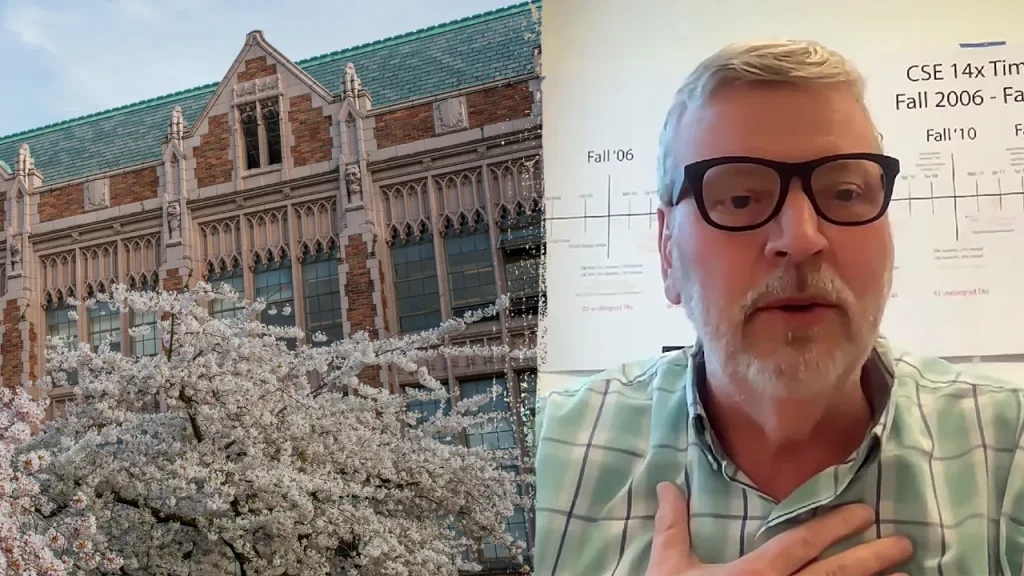University of Washington Professor Criticizes Strict DEI Requirements
The Controversial Pledge and Its Impact
At the University of Washington, teaching professor Stuart Reges has raised serious concerns about the university’s diversity, equity, and inclusion (DEI) requirements for new faculty hires. Despite winning the Distinguished Teaching Award at UW’s Paul G. Allen School of Computer Science and Engineering, Reges believes he wouldn’t stand a chance if applying for his position today. “You have to say that you have deep knowledge of DEI in order to get a high rating,” Reges explained, highlighting how these requirements may overshadow academic achievements and teaching excellence. The university’s job listings explicitly demand “diversity statements” from all applicants, including one for an associate professor of school psychology that requires candidates to describe their “identity, positionality, experience and commitment to diversity, equity, and inclusion” as well as their alignment with professional DEI frameworks and the college’s commitment to racial equity and social justice.
Assessment Rubrics and Academic Freedom Concerns
Beyond the initial hiring process, the university employs a performance assessment rubric that includes a “Diversity” section rating professors from “poor” to “excellent.” Those receiving a “poor” rating are described as showing “little evidence of potential to contribute to the UW Diversity Blueprint.” This systematic evaluation has created what some critics describe as an ideological filter that prioritizes specific political viewpoints over academic merit. Seattle radio host Jason Rantz characterized the situation bluntly, stating that “this application process makes it easier to discriminate against conservatives” and that “the university isn’t looking for diverse thought; it’s enforcing a monoculture of approved political opinions.” Reges has witnessed the consequences firsthand, noting that “very talented faculty” have left the university due to these pressures, while promising graduate students increasingly avoid academic careers altogether, asking “why bother” with requirements that feel inauthentic.
The Exodus of Talent and Manufactured Compliance
The ripple effects of these DEI policies extend beyond current faculty to affect the future academic landscape. “I’ve known faculty, very talented faculty who’ve left because of this kind of pressure and people who won’t even apply,” Reges shared. His observations suggest an emerging talent drain as academics who might otherwise contribute valuable research and teaching expertise choose different paths. The requirement to “basically make up a statement that’s going to make them happy” creates what Reges and others view as a system of manufactured compliance rather than genuine diversity of thought. Graduate students who might have pursued teaching careers increasingly see the extensive DEI requirements as obstacles rather than meaningful contributions to academic life. This situation raises questions about whether institutional DEI initiatives are achieving their stated goals of creating more inclusive environments or instead establishing new forms of ideological conformity.
Legal Challenges and Federal Response
These practices at the University of Washington have attracted attention at the federal level, particularly in light of President Trump’s executive order titled “President Donald J. Trump Protects Civil Rights and Merit-Based Opportunity by Ending Illegal DEI.” The executive order explicitly criticizes how “many corporations and universities use DEI as an excuse for biased and unlawful employment practices and illegal admissions preferences,” arguing that such practices “foster intergroup hostility and authoritarianism.” The university’s DEI policies have placed it under investigation by the U.S. Department of Education’s Office for Civil Rights, which launched inquiries into multiple universities for “race-exclusionary practices in education programs and activities.” This federal scrutiny raises significant questions about the legality of certain diversity initiatives when they potentially conflict with civil rights protections and merit-based advancement.
The University’s Response and Position
When confronted with these criticisms, the University of Washington defended its approach while acknowledging the need for review. “The University of Washington does not view diversity and access as being in opposition to merit and excellence, and we remain committed to providing access to excellence for all,” a university spokesperson stated. The spokesperson emphasized that their “hiring practices adhere to state and federal laws in ensuring that race is not a factor in hiring.” However, the university did take action regarding the specific College of Education job posting that had drawn criticism, noting they were “canceling it and providing additional guidance on hiring practices before it is reposted.” This response indicates some institutional recognition of potential issues with their DEI implementation, even as they maintain commitment to their diversity goals.
The Broader Debate Over Academic Values
The situation at the University of Washington reflects a larger national conversation about the balance between diversity initiatives and traditional academic values such as merit, excellence, and intellectual freedom. Critics like Reges contend that current DEI implementations create ideological litmus tests that undermine academic freedom and exclude qualified individuals with dissenting viewpoints. Supporters of robust DEI policies argue these frameworks are necessary corrections to historical exclusion in academia. The university’s statement that they “are also reviewing hiring practices more broadly to ensure that they follow state and federal laws” suggests an acknowledgment that the implementation of DEI principles requires careful consideration of legal and ethical boundaries. As public institutions navigate these complex issues, questions remain about how to create truly inclusive academic environments that also protect intellectual diversity and academic freedom—a challenge that extends well beyond the University of Washington to campuses nationwide.


